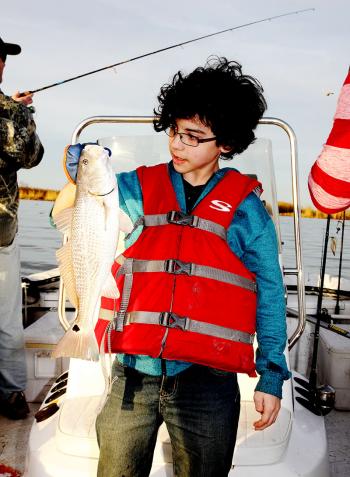
Gabriel Flores, John Flores' grandson, wears a personal flotation device while on board a vessel. (Submitted Photo/Courtesy of John K. Flores)
Boaters are encouraged to wear life vests
I was in my late 30s when I decided to wear a personal floatation device. It was when my boys were old enough to start hunting and fishing with me.
Perhaps like all moms, Mrs. Flores internally would have certain trepidations about me taking them at such a young age. But, she knew it was part of their rite of passage into manhood.
The first time we went out, I went through my mental checklist. Just before we left the landing one last time, I passed my eyes all around the outside and inside of the boat and then hesitated.
Looking at their faces and when seeing their life vests secured properly around their bodies, it dawned on me: What good was it for them to be wearing their personal floatation devices and not me? If we had an accident and I happened to fall overboard or worse, die, I would be of no help to them. And where we were going in the marsh was off the beaten path.
I’m grateful for whatever quickened me that day. Maybe it was common sense. Maybe it was Christine back in town praying for our safety, and the Lord brought it to mind. Whatever it was, it’s a habit today. When my boat is moving, everyone on board is wearing a personal flotation device.
Louisiana Department of Wildlife and Fisheries spokesman Adam Einck says some of the reasons why people don’t wear their life vests is many today know how to swim and have a lot of experience on the water. They’ve never been in trouble, so they don’t think they need to. Others, in our warm climate, find personal flotation devices hot, uncomfortable and too cumbersome to wear.
“You don’t need it until you need it,” Einck said. “You get comfortable doing something for a long time, and sometimes, that’s when one of those things happens and then it’s too late. You don’t have the proper safety equipment on your body.”
Statistically, Louisiana boating fatalities have reached or exceeded 20 the past two years. In 2015 there were 22 boating fatalities, where 18 people were not wearing their personal floatation devices.
Put another way, more than 80 percent of the people who drowned were not wearing a life vest.
So far in 2016 through September, there have been 20 boating fatalities. Fourteen were a result of persons not wearing their life vests.
With three months remaining in the year, Louisiana Department of Wildlife and Fisheries Boating Education Coordinator, Lt. Clay Marques, said, “We still have got a lot of duck hunters, a lot of recreational boaters and a boat parade for Christmas coming up this year. We’ve got a lot going on before the year ends. This is the Sportsman’s Paradise, and you have a lot of people running their boats. There’s a lot of traffic. And we have over 300,000 vessels registered in this state, so it’s a lot of people.”
Marques pointed out people should slow down and not be in such a hurry. It’s excessive speed that often causes accidents. He also says improperly taking on a head wave is dangerous.
Additionally, rivers and bayous where there are sharp curves are extremely hazardous, especially when someone isn’t paying attention.
Therefore, it’s important to have someone in the boat acting as a lookout.
Einck says there are five common sense things boaters should consider before going out on the water.
One, wear your personal floatation device. If people would wear their life vests, it would go a long way in reducing fatalities.
Two, have a sober boat operator.
Three, file a float plan with your loved ones, making sure they know where you’re at and when you’re supposed to be home.
Four, communication is very important, particularly when destinations are in remote locations. Einck suggest carrying your cell phone with you at all times but also placing them in some type of waterproof case or Ziploc bag.
Five, with a couple of nighttime incidents occurring recently, Einck also suggests making sure your running lights work.
Though currently not required for older adults, Marques says Louisiana law states that anybody 16 years of age and younger must wear a U.S. Coast Guard-approved life vest while their vessel is underway.
Moreover, he encourages everyone to take a boating safety course.
It’s also important to note that those born after Jan 1, 1984, are required to take a safe boating course before they can operate a boat.
To sign up for a boating course, visit www.wlf.louisiana.gov and click on “boating” for more details.
EDITOR’S NOTE: John K. Flores is The Daily Review’s Outdoor Writer. If you wish to make a comment or have an anecdote, recipe or story to share, you can contact Flores at 985-395-5886 or email gowiththeflo@cox.net or visit his Facebook page, gowiththeflo outdoors
- Log in to post comments
